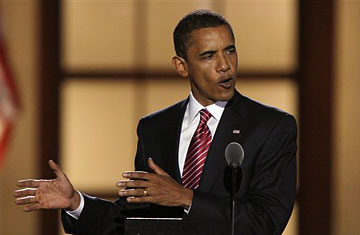
Democratic presidential nominee Sen. Barack Obama during his acceptance speech at the 2008 Democratic National Convention on Aug. 28
Barack Obama's acceptance speech tonight wasn't what people have come to expect from a Barack Obama speech. It wasn't filled with lofty rhetoric or grand cadences. It did not induce tears or euphoria. It didn't have the forced, kitschy call and response tropes — "and that's the change we need!" — that defaced nearly every other major speech at this convention. At 43 minutes, nailing his dismount at 10:53 pm, it wasn't even very long. It was lean, efficient, practical and very very tough.
It was the perfect speech for a skeptical nation. In some ways, the heart of it was near the end, when Obama directly confronted a country that has lost faith in government — and an opposing party that preys on that cynicism:
"I know there are those who dismiss such beliefs as happy talk. They claim that our insistence on something larger, something firmer and more honest in our public life is just a Trojan Horse for higher taxes and the abandonment of traditional values. And that's to be expected. Because if you don't have any fresh ideas, then you use stale tactics to scare the voters. If you don't have a record to run on, then you paint your opponent as someone people should run from.
You make a big election about small things.
And you know what — it's worked before. Because it feeds into the cynicism we all have about government. When Washington doesn't work, all its promises seem empty. If your hopes have been dashed again and again, then it's best to stop hoping, and settle for what you already know.
I get it."
He delivered that, "I get it," perfectly, conversationally: It said, "I know what you guys are thinking." And the rest of the speech — every sentence, every paragraph — reflected that knowledge. His mission was to win over a doubtful nation, to convince us that he was a pragmatist, not a dreamer. Indeed, he used the word "dream" only once or twice. He didn't even talk about the "American Dream." He called it the "American Promise." He didn't tell us that he was different from Martin Luther King and the civil rights generation of black leadership; he showed us.
He began by setting the predicate, with a sleek précis of the Bush failures and John McCain's complicity. "Eight [years] is enough," he said. It was time for a change. His stories of the problems of the people he met along the way, the collateral damage of the Bush presidency, came closest to cliché — they weren't nearly as convincing as the stunning parade of Average Americans that preceded his speech, including a laid-off factory worker named Barney Smith who delivered the immortal line, "We need a government that cares more about Barney Smith than Smith Barney."
But Obama went through his domestic policy solutions to their problems without making it seem like a laundry list — and then he simply hammered John McCain on McCain's perceived strength, foreign policy. This is something that Republicans do and Democrats shy away from — challenging their opponents on perceived strength. At a moment when Americans are sick of the foreign entanglements that John McCain seems to seek at every turn, it seems a potentially profitable maneuver for Obama.
Obama went bluntly up into McCain's grill, time and time again — challenging him on the sort of campaign he was running, and especially on the sleazy tactic of questioning Obama's patriotism:
"The times are too serious, the stakes are too high for this same partisan playbook. So let us agree that patriotism has no party. I love this country, and so do you, and so does John McCain. The men and women who serve in our battlefields may be Democrats and Republicans and Independents, but they have fought together and bled together and some died together under the same proud flag. They have not served a Red America or a Blue America – they have served the United States of America.
So I've got news for you, John McCain. We all put our country first."
He delivered that line well, too.
In a normal year, a year when the public would have a week or two to digest this night, my guess is that this speech would have a dramatic impact on the race — and it still might. But by tomorrow night, it won't even be the lead story on the evening news. McCain's vice presidential selection will be. And then McCain will have the luxury of going second — batting last — next week, staging a convention that will, no doubt, lacerate Obama and the Democrats and then climax with McCain telling his incredible life story. By this time next week, Obama's speech will be a distant memory to those of us in the media. By this time two weeks from now, I wouldn't be surprised if John McCain were ahead in the polls.
But Barack Obama laid down an important marker at Invesco Field — and he may have convinced more than a few white working-class skeptics to give him a closer look when the debates roll around. He stood there not as an orator, but as a plausible chief executive. His message was as tight as a power-point presentation, but far more elegant. And tough — above all, tough: not an egghead, not Adlai Stevenson. No, tonight Barack Obama was a politician from the south side of Chicago, ready for the brawl of his life.
